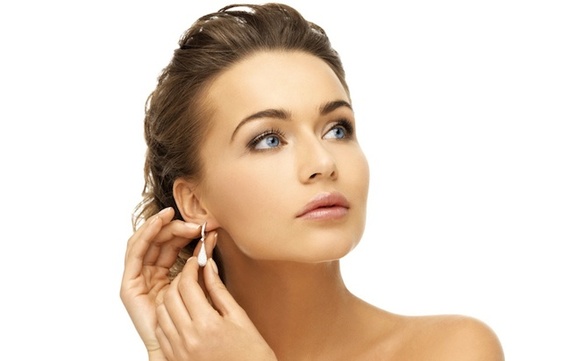A gorgeous pair of earrings is a great accessory—but what’s the deal with the holes in your ears smelling like rotten cheese? Turns out it’s a mix of skin cells and natural oils getting clogged all up in there. Um, gross.
Luckily, there’s a super easy way to prevent—or get rid of—that funky smell if you notice it. You should clean your old piercings in the shower and let warm water run over it, says Maria Tash, owner of Venus by Maria Tash, a fine jewelry and piercing spa in New York City. “Cleaning the piercing tunnel occasionally with antibacterial soap also cleans off any skin cells that can collect in the jewelry and create odor.”
But don’t freak out if you’ve had your ears (or another part of your body) pierced forever and they start to get itchy all of sudden. Infections aren’t common in healed piercings, says Tash. You’re probably just allergic or sensitive to the material in your earrings (nickel is the most common ingredient people have a reaction to), which could antagonize the surrounding skin in the form redness, tenderness, discharge, or itchiness. In that case, opt for stainless steel or hypoallergenic earrings.
When it comes to new piercings, a little redness and slight crustiness is totally normal while it heals, says Tash. But if your skin is raised or there’s a ring or bump forming around the piercing, your body may be telling you it’s not happy with your newest accessory, says David E. Bank, M.D., director of the Center for Dermatology, Cosmetic, and Laser Surgery in Mount Kisco, New York.
You may be dealing with the beginning stages of an infection. Since there is a foreign body present in the skin, some of the bacteria may be sitting on the piercing itself, which can cause the body to reject it as a way of protecting itself, says Bank. Here’s what you can do to keep new piercings free of additional irritation—or an infection (hey, you may have heard this when you were younger, but it’s worth repeating):
Never touch your piercing with dirty hands. “You don’t want to touch a door handle and then touch your jewelry,” says Tash. “You just transferred whatever is on the door handle to your piercing.”
Change your bed sheets frequently. You already know how grimy dirty sheets are, but they can be bad news for a new piercing, too. Any hair or dander on your sheets can easily be transferred from your pillowcase onto your healing skin. “You have to be mindful that you have a fresh wound that takes a while to heal, and you have to keep everything around you as clean as reasonably possible,” says Tash.
Make sure your earring fits properly. If the piercing is feeling too tight or too loose, have your piercer look at it to make sure it isn’t sitting too tightly or at an odd angle, which can irritate it.
Don’t overdo it with cleaning. “People commonly think, ‘I’ve got something to sterilize, let me throw this harsh chemical on it,’” says Tash. “But it’s very harsh. It will make your skin sensitive after a while. I can’t say it will happen right away, but if you keep using [something harsh] twice a day, it will make your skin red.” The Association of Professional Piercers suggests avoiding alcohol, hydrogen peroxide, or other strong solutions. Instead, clean the area around your piercing once a day with a mild fragrance-free liquid soap and soak it once a day in a warm saline solution.
BY ALISA HRUSTIC
